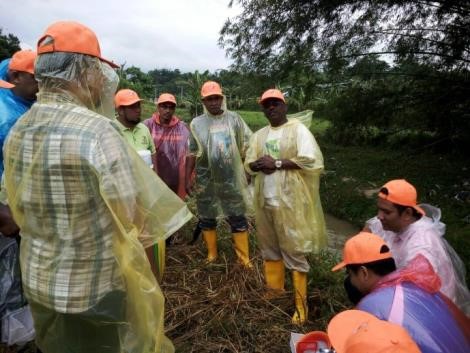These multifaceted complexities also happen in Malaysia. These complexities such as lack of education and awareness of the general public about water resources, how they are being managed, and how they should be managed is a key factor that has led to the state of Malaysia's overall water quality. The most concerned issues of water quality among other is the quality of the river. As one of water resources, river serves as a multi-functional unit in an ecosystem where one of its functions is being the source for potable water. Lately river pollution has become one of many crucial problems faced by healthy ecosystems in Malaysia.
A simple yet comprehensive action actually can be practiced by any individual or community to achieve a continuous and effective river monitoring action that will contribute to the improvement of river quality program. Malaysia Country Water Partnership and River Rangers community saw the opportunity to contribute in mobilizing communities living along rivers to be active participants in improving river quality program. Malaysia Country Water Partnership in collaboration with its partner, GEC (Global Environment Center) Malaysia, organized TOT (Training of Trainers) River Rangers that not only could enhance knowledge, awareness and skills of the community but also to stimulate the decision makers to start thinking of sharing roles with the community in river monitoring and river quality improvement in overall.
Why TOT River Rangers? Firstly, it’s an event where community can learn to further understand about key function of river in supporting all aspects of life and simultaneously practicing on how to monitor river quality. Secondly, to put forward a message for all stakeholders that maintaining river quality cannot be done alone by the government. The community can also have their significant roles if involved.
The RIVER Ranger TOT was conducted in one and half day workshop (15-16 November 2017) which consists of both theoretical and practical activities. The objectives of RIVER Ranger TOT are:
· To promote community river monitoring programs among government agencies, school teachers and other relevant agencies.
· To improve and enhance capacity, knowledge and skill in effective river monitoring especially on physical, chemical and biological monitoring.
· To empower participants to enhance the role of community/public participation for river monitoring and flood preparedness.
Some of the key topics covered are river pollution, river care, river monitoring (physical, chemical & biological), river and domestic waste management, climate change, flood and drought preparation. As for the boundary actors, several main targeted audiences were involved in the TOT River Rangers, such as Drainage & Irrigation Department Malaysia, local agencies and school teachers.
This activity has provided awareness, knowledge and appropriate skills to participants from various backgrounds especially to relevant local authorities/agencies, school teachers and local communities in helping to monitor and improve river water quality at local level. Besides that, participants were also exposed to preparation for climate change impacts focusing on flood and empowered on how to start a localized river care project. As post training follow up, Malaysia Country Water Partnership and GEC will support the best proposed action to be implemented by Q2 2018.
In overall, this activity’s output is contributing to the outcome challenge 2.2: Stakeholders gain improved political awareness and commitment to deliver water security with demonstrable follow-up commitments and actions. It is expected that this grassroot activity can contribute to the any on-going development of policy at the national level related to IWRM.
